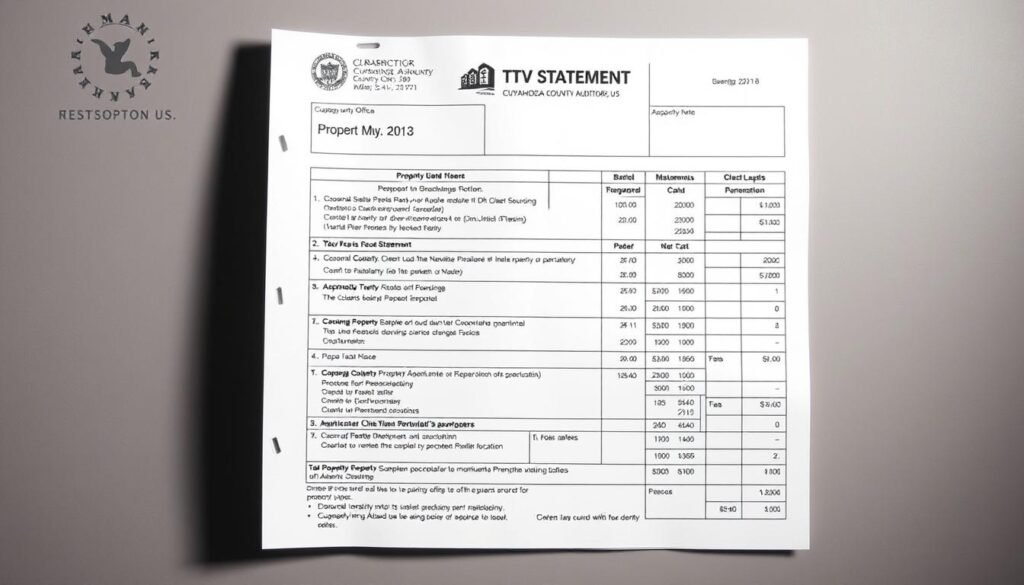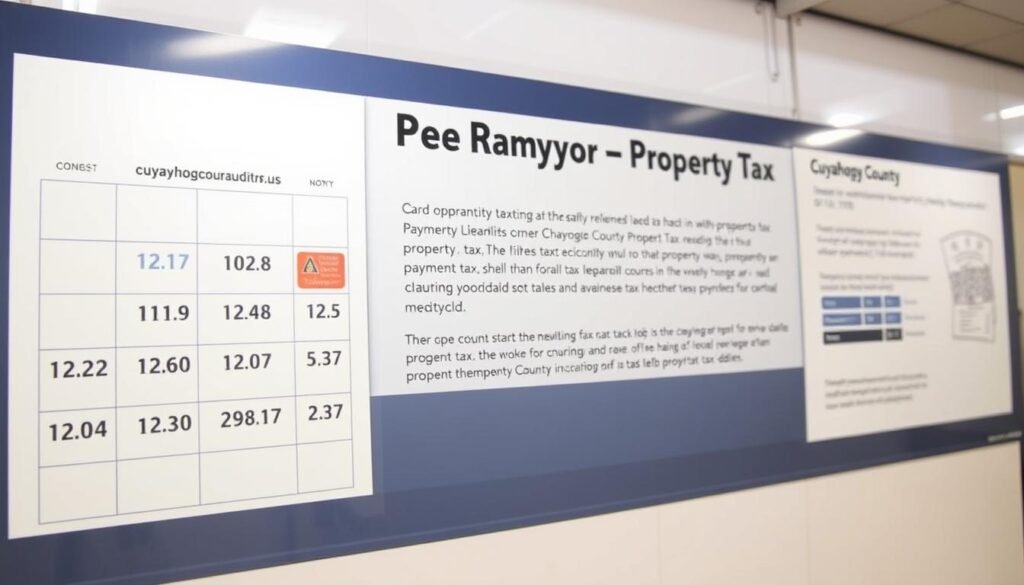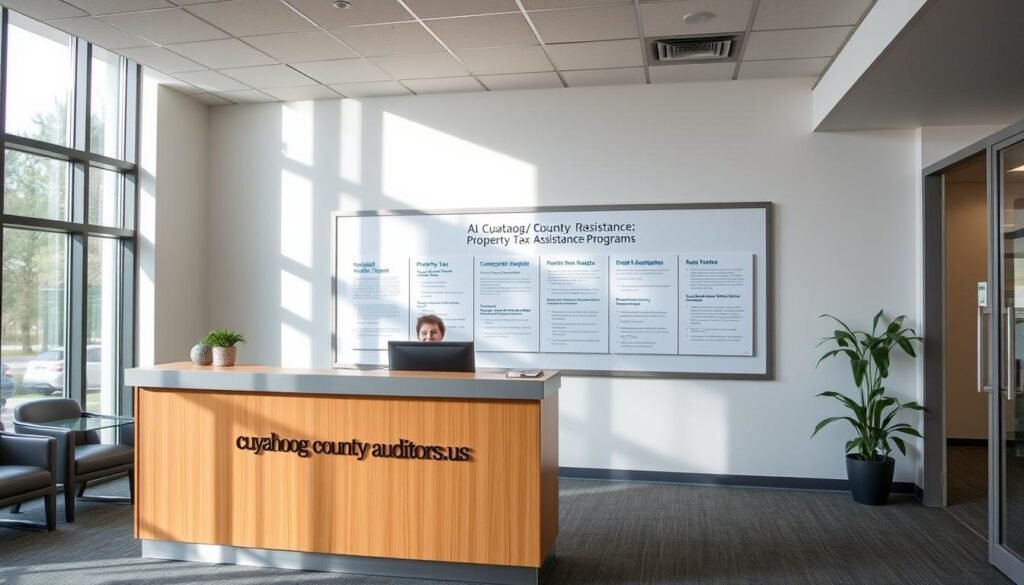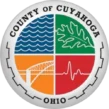Did you know that millions of property tax payments are made every year in Cuyahoga County? It’s important to understand your property tax bill to manage your finances well. Jason, an expert from CuyahogaCountyAuditors.us, offers valuable advice on this complex topic.
When you get your tax bill, knowing how to check and pay it is key. The Cuyahoga County Auditor’s office has a property tax payment portal for easy payments. Being informed about your property tax can also help you avoid fines.
Key Takeaways
- Understand the components of your property tax bill.
- Learn how to assess your property tax accurately.
- Discover the convenient property tax payment portal.
- Know the process for a tax bill inquiry.
- Stay informed to avoid late payment penalties.
Understanding Your Cuyahoga County Property Tax Bill
The Cuyahoga County Auditor’s office gives you detailed property tax information on your bill. This helps you understand how your taxes are figured out. It’s key for homeowners to manage their money well.
Components of Your Property Tax Bill
Your Cuyahoga County property tax bill has important parts. They show your real estate tax assessment and how to pay. The main parts are:
- Property description and location
- Assessed value of the property
- Tax rates applied to your property
- Total tax amount due
- Payment due dates
Knowing these parts is key to paying the right amount on time.
How Property Taxes Are Calculated
Property taxes in Cuyahoga County are based on your property’s real estate tax assessment. The assessment is a percentage of your property’s value. Then, the tax rate is applied to this value to find your tax.
The formula is simple: Property Tax = Assessed Value x Tax Rate. But, other things like local levies and exemptions can change your tax amount.
Homeowners can check their property’s details online. This makes it easier to pay property taxes online or look at other payment options.
The Role of the Cuyahoga County Auditor in Property Taxation
The Cuyahoga County Auditor is key in making sure property taxes are fair and correct. They handle many tasks that affect property owners in the county.
Key Responsibilities of the County Auditor
The County Auditor has important key responsibilities for property taxes.
- Property Assessments: They check the value of properties in Cuyahoga County. This makes sure values are right.
- Tax Bill Preparation: They create and send out tax bills. This is based on property values and tax rates.
- Maintaining Records: They keep up with who owns properties, their values, and tax payments.
Meet Jason: Your Expert Auditor Guide
Jason is a seasoned auditor with deep knowledge of property tax assessments.
Jason’s Experience with Property Tax Assessments
Jason has a lot of experience with property tax assessments. He has worked on many cases involving appeals and tax exemptions.
How Jason Helps Residents Navigate Tax Questions
Jason helps people understand their tax bills. He guides them through the assessment process and offers advice on tax relief programs.
Accessing Your Cuyahoga County Auditor Property Tax Bill
The Cuyahoga County Auditor’s office makes it easy to get your property tax bill. They offer several ways to help all residents.
Online Access Methods
Getting your property tax bill online is simple. Just visit the Cuyahoga County Auditor’s website and follow these steps:
Creating an Account on the Auditor’s Website
To see your property tax bill online, first create an account. You’ll need to give some basic info and prove who you are.
- Go to the Cuyahoga County Auditor’s website.
- Click on the “Create Account” or “Register” button.
- Fill in the required information, such as your name and email address.
- Verify your identity as prompted.
- Set up a username and password for your account.
Navigating the Property Search Function
With an account, you can search for your tax bill.
- Log in to your account on the Cuyahoga County Auditor’s website.
- Navigate to the “Property Search” section.
- Enter your property details, such as the parcel number or your address.
- Click on “Search” to find your property.
- Your property tax bill information will be displayed, and you can view or download it as needed.
In-Person and Mail Options
If online isn’t your thing, you can get your bill in person or by mail.
To get your bill in person, visit the Cuyahoga County Auditor’s office during business hours. You might need to show ID and proof of property ownership.
Or, you can ask for your bill by mail. Just contact the Cuyahoga County Auditor’s office with your property details.
| Method | Description | Advantages |
|---|---|---|
| Online | Access your property tax bill through the Cuyahoga County Auditor’s website. | Quick, available 24/7, can be downloaded or printed. |
| In-Person | Visit the Cuyahoga County Auditor’s office to obtain your bill. | Immediate access, can ask questions in person. |
| By Mail | Request your property tax bill to be sent to you by mail. | Convenient for those who prefer paper records. |
Reading and Interpreting Your Property Tax Statement
It’s important to understand your property tax statement in Cuyahoga County. Your tax bill shows how much you owe and how your property is valued. This information helps you manage your finances.
Breaking Down Tax Bill Sections
Your tax statement has different sections with important details. Knowing what each part means helps avoid surprises with your taxes.
Understanding Assessed Value vs. Market Value
The assessed value is a part of your property’s market value. In Ohio, it’s usually 35% of the market value. This is key to understanding your tax bill.
For example, if your property is worth $100,000, its assessed value is $35,000. This value is used to figure out your property taxes.
Deciphering Tax Codes and Districts
Your tax bill lists tax codes and districts. These codes show where your tax money goes. They help fund schools, local governments, and special projects.
| Tax Code | District | Description |
|---|---|---|
| 001 | School District | Funds local schools |
| 002 | Municipal Corporation | Supports local government services |
| 003 | Special District | Funds specific local projects or services |
Understanding Tax Rates and Levies
Tax rates and levies are key parts of your tax bill. The tax rate is how much tax you pay per $1,000 of assessed value. Levies are extra taxes for local projects or services.
For example, a school levy might raise your tax rate. Knowing this helps you plan for tax changes.

Cuyahoga County Auditor Property Tax Bill Payment Options
The Cuyahoga County Auditor’s office makes paying your property tax bill easy. You can choose from several convenient options to settle your taxes quickly.
Online Payment Portal
Paying online is fast and simple. The Cuyahoga County Auditor’s website has a secure portal. Here, you can pay property taxes online Cuyahoga County with your bank account or credit card.
Step-by-Step Payment Instructions
To pay online, just follow these steps:
- Go to the Cuyahoga County Auditor’s website.
- Find the property tax payment section.
- Enter your property tax parcel number or account number.
- Choose how you want to pay.
- Put in your payment info and confirm it.
Setting Up Automatic Payments
Setting up automatic payments is convenient. It lets the Cuyahoga County Auditor take your payment from your bank on the due date. This way, you’ll never forget to pay.
Alternative Payment Methods
If online payment isn’t for you, Cuyahoga County has other ways to pay your property tax payment Cuyahoga County.
Mail-in Payments
You can send your payment by mail. Make sure your check or money order is to the Cuyahoga County Treasurer. Include your property tax parcel number.
In-Person Payment Locations
You can also pay in person. Visit the Cuyahoga County Auditor’s office or other authorized centers in the county.
Payment by Phone
For a personal touch, you can pay by phone. Call the Cuyahoga County Auditor’s office. Have your property tax parcel number and payment details ready.
The Cuyahoga County Auditor’s office offers many cuyahoga county tax payment options. Whether you like online payments or other methods, there’s something for everyone.
Important Deadlines for Cuyahoga County Property Taxes
Knowing when your Cuyahoga County property taxes are due is key to avoiding extra fees. As a property owner, you must pay on time to avoid extra costs.
Annual Due Dates
In Cuyahoga County, property taxes are paid in two parts. The first half is due by January 31st, and the second half by July 31st. Make sure to remember these dates to avoid missing payments.
- First half payment due: January 31st
- Second half payment due: July 31st
Consequences of Late Payments
Missing your property tax payment deadlines can lead to penalties and interest. Knowing this can help you make timely payments.
Penalty Rates and Interest Charges
Cuyahoga County charges a penalty for late tax payments. The penalty rate can change, so check with the Auditor’s office for the latest info. Also, interest is added to the unpaid amount, making the total due even higher.
Key points to remember:
- Penalty rates are subject to change, so verify with the Auditor’s office.
- Interest accrues on the outstanding balance.
Tax Delinquency Process
If you don’t pay your property taxes, your account could be considered delinquent. The county will send notices and may take further steps, like placing a tax lien or foreclosure.

To avoid these issues, it’s important to know your property tax duties and pay on time. For the latest info, visit the Cuyahoga County Auditor’s website or call their office.
Property Assessment Process in Cuyahoga County
Knowing how properties are assessed in Cuyahoga County is key for homeowners and buyers. The assessment process is vital for figuring out property taxes. These taxes impact how much homeowners pay each year.
How Properties Are Valued
Properties in Cuyahoga County are valued based on their market worth. This value is influenced by many factors. The county’s auditor’s office uses a detailed method to get accurate property values.
Factors Affecting Property Valuation
Several things can change how much a property is worth, including:
- Location: How close it is to schools, shops, and public transport.
- Property condition: Its age, upkeep, and overall state.
- Comparable sales: Recent sales of similar homes in the area.
- Improvements: Any updates or additions made to the property.
The Role of Comparable Sales
Comparable sales are very important in setting property values. The county’s auditor looks at recent sales of similar homes. This helps figure out a fair market value.
Reassessment Schedules and Procedures
Cuyahoga County regularly checks property values to keep them up to date. These checks happen every few years. There are clear steps to tell property owners about any changes in their property’s value.
The county’s auditor’s office shares all the details about reassessment schedules and steps. This helps property owners know when and how their properties will be checked.
Challenging Your Property Tax Assessment
Property owners in Cuyahoga County can appeal their property tax assessments if they think the valuation is wrong. Knowing the process and what you can appeal for can make it easier.
Grounds for Appeal
You can appeal if you think the valuation is too high or wrong. Reasons include:
- Incorrect property characteristics, like wrong square footage or number of bedrooms.
- Comparable sales data showing a lower valuation.
- Recent renovations or damage that lowers the property’s value.
It’s key to gather evidence for your appeal. This could be photos, repair estimates, or data on similar property sales in your area.
Step-by-Step Appeal Process
The appeal process has several steps:
- First, review your assessment notice to understand the valuation and any changes.
- Next, collect evidence to support your appeal, like data on comparable sales or recent renovations.
- Then, file your appeal with the Cuyahoga County Board of Revision within the deadline.

The deadline to file an appeal is usually within 30 days of the assessment notice. Missing this deadline can mean your appeal is dismissed, so it’s important to act fast.
Documentation Required for Appeals
To support your appeal, you’ll need to provide certain documents, such as:
- Evidence of incorrect property characteristics.
- Data on comparable sales.
- Records of recent renovations or damage.
By understanding what you can appeal for and following the steps, you can challenge your property tax assessment. This might help lower your tax burden.
Property Tax Exemptions and Relief Programs
If you own a home in Cuyahoga County, you might get property tax breaks. These programs help lower your taxes if you qualify. They make owning a home more affordable.
Homestead Exemption
The Homestead Exemption is a big help for homeowners. It lowers your property taxes. But, you must meet certain rules to qualify.
Eligibility Requirements
To get the Homestead Exemption, you must be 65 or older, or disabled. You could also be a surviving spouse of a disabled veteran or a veteran who died in service. Your income must also not go over Ohio’s limits.
Application Process
To apply for the Homestead Exemption, you need to fill out a form. You’ll also need to provide documents like proof of age or disability. You’ll need to show your income too.
Other Available Tax Relief Options
Cuyahoga County has more tax relief options. These include help for seniors, disabled citizens, and military families.
Senior and Disabled Citizen Programs
Seniors and disabled citizens get extra tax relief. It’s based on income and other criteria. These programs help make taxes easier for those who need it most.
Military Service-Related Exemptions
Homeowners who served in the military might get special tax breaks. These exemptions are a big help. They recognize the sacrifices of military families.
Understanding Tax Distribution in Cuyahoga County
Knowing where your tax money goes is key for homeowners in Cuyahoga County. Property taxes are split among many groups and funds. This process involves different stakeholders and how funds are used.
Where Your Tax Dollars Go
Your property taxes in Cuyahoga County support many areas. The main groups getting your money are school districts, local services, and municipal services.
School District Funding
A big part of your taxes helps fund local schools. This money is vital for:
- Educational programs and resources
- Teacher salaries and benefits
- School infrastructure maintenance and upgrades
In 2022, schools in Cuyahoga County got a lot of funding. This helped with educational programs and operational costs.
Municipal Services Funding
Property taxes also fund important municipal services. These include police and fire departments, public transportation, and waste management. These services keep us safe, maintain our infrastructure, and improve our community’s well-being.
Key municipal services funded by property taxes include:
- Emergency services (police, fire, and ambulance)
- Public transportation systems
- Waste collection and disposal services
Local Services Funded by Property Taxes
Property taxes also support other local services. These include:
- Community development programs
- Public health initiatives
- Recreational facilities and programs

Understanding how your taxes are used helps you see their impact on our community.
Comparing Cuyahoga County Property Tax Rates
If you own a home in Cuyahoga County, knowing about property tax rates is key. These rates can greatly affect your budget. Understanding them helps you make better financial choices.
Tax Rates Across Different Municipalities
Cuyahoga County has many towns, each with its own tax rate. These rates can change a lot, impacting your tax bill. Some towns might have higher rates to support local services and projects.
Historical Tax Rate Trends
Looking at past trends in property taxes can be enlightening. Over time, Cuyahoga County’s tax rates have gone up and down. This is due to the economy and laws changing.
Recent Changes in Tax Rates
In recent years, Cuyahoga County’s property tax rates have seen big changes. These changes usually come from the economy, new laws, or shifts in local spending.
Projected Future Trends
Looking forward, property tax rates in Cuyahoga County might keep changing. Economic growth, housing trends, and local policies will influence these rates.
Keeping up with these trends helps you get ready for any changes in your property taxes.
Resources for Property Tax Assistance
The Cuyahoga County Auditor’s office helps with property tax questions. They make sure property owners know how to deal with property taxes.
County Auditor Support Services
The County Auditor’s office has many services for property owners. They give details on property assessments, tax rates, and how to pay.
Contacting the Auditor’s Office
Property owners can get help by contacting the Cuyahoga County Auditor’s office. They can use the website or visit in person. The staff is ready to help with property tax questions.
Contact Information:
- Phone: 216-443-7000
- Email: auditor@cuyahogacounty.us
- Website: Cuyahoga County Auditor
Available Educational Resources
The Auditor’s office has educational materials. They include guides, FAQs, and workshops. These help property owners understand their taxes and the assessment process.
“Understanding your property tax bill is the first step in managing your tax obligations effectively.” –

Community Tax Help Programs
There are community programs to help property owners too. These programs offer extra support. They help those who might be eligible for tax exemptions or relief.
| Program | Description | Eligibility |
|---|---|---|
| Homestead Exemption | Reduces the taxable value of a property for eligible homeowners. | Homeowners aged 65+ or disabled. |
| Property Tax Relief | Provides relief to property owners facing financial hardship. | Varies by program; typically income-based. |
Digital Tools for Managing Your Property Taxes
The Cuyahoga County Auditor’s office has digital tools to help with property taxes. These tools make it easier to find information, pay taxes, and stay updated.
Property Search and Tax Calculators
The Cuyahoga County Auditor’s website has a property search tool. It lets you find your property details and tax info online. There are also tax calculators to estimate your taxes based on different factors.
Mobile Apps and Notification Services
You can manage your property taxes with mobile apps and notification services. These services send reminders about payment due dates and updates on your tax status.
Setting Up Tax Payment Reminders
To avoid missing payment deadlines, set up tax payment reminders through the Cuyahoga County Auditor’s office. This keeps you on track with your tax payments.
Tracking Your Payment History
The digital tools also let you track your payment history. This gives you a clear record of past payments and helps with future tax planning.
| Digital Tool | Description | Benefits |
|---|---|---|
| Property Search | Look up property details and tax information | Easy access to property records |
| Tax Calculators | Estimate property taxes based on various factors | Helps in financial planning |
| Mobile Apps | Manage property taxes on-the-go | Convenience and flexibility |
| Notification Services | Receive reminders and updates on tax status | Stay informed and avoid late payments |
Conclusion
Knowing your Cuyahoga County Auditor property tax bill is key to managing your taxes well. It helps you understand your tax bill, the role of the Cuyahoga County Auditor, and how to pay. This way, you can handle your property taxes better.
The Cuyahoga County Auditor offers tools to help with your property taxes. You can check your tax bill online and track payments digitally. Knowing about tax rates, how assessments work, and exemption programs can also help you.
Using these tools and understanding your tax bill well can help you pay on time. You might even save money with exemptions. Good property tax management is not just about following rules. It also helps your community thrive.
